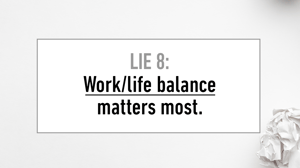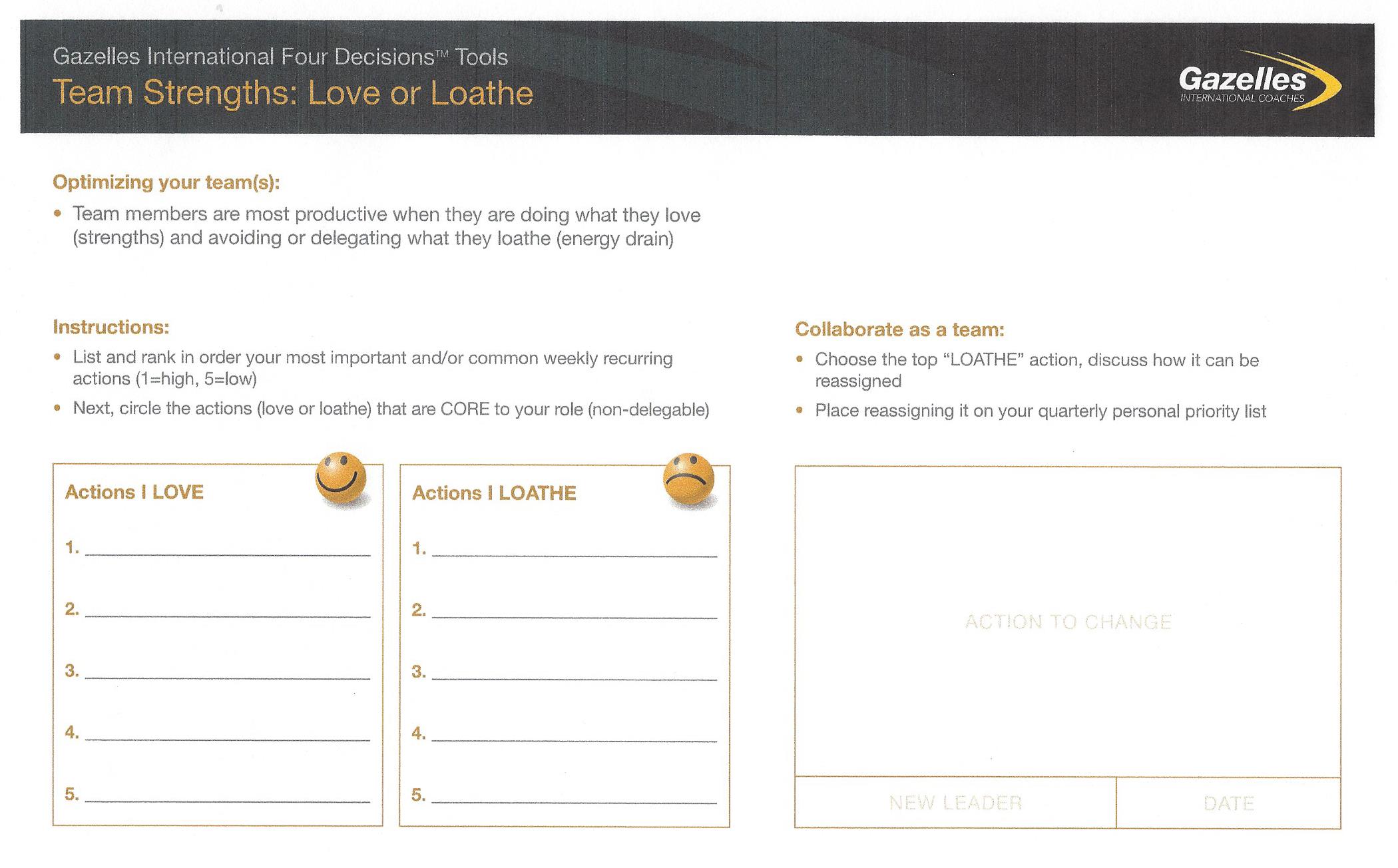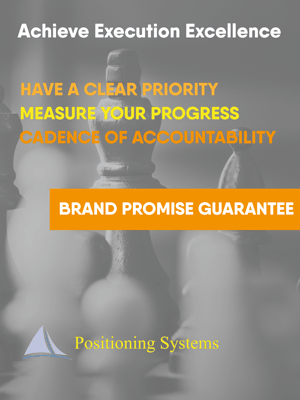 “Do what you love, and you’ll never work a day in your life again”
“Do what you love, and you’ll never work a day in your life again”
You’ve heard this before. Do you believe it?
For the past 20 years I’ve been doing the work that I love, and believe it, yet the authors Marcus Buckingham and Ashley Goodall of Nine Lies About Work: A Freethinking Leader’s Guide to the Real World don’t believe anyone truly does.
The theoretical models of what people are supposed to feel about their work rarely, if ever, match up to what a person truly does feel.
And that question, really isn’t the question here. The question asked is does work-life balance matter most.
It just so happens loving your work fits into this equation.
Watch Marcus Buckingham on Work/Life Balance:
Balance as Buckingham notes is stasis. In other words, the world is constantly changing and to be in balance is not healthy.
Something can be said to be “healthy” only when its process allows it to take inputs from the world, and first, metabolize them to produce something useful, and second, do so in such a way that it can keep doing it.
Thus, health is less balance than it is motion.
You are at your healthiest when you find this particular kind of raw material, draw it in, allow it to feed you, and use it to contribute something—and when that contribution actually seems to leave you with more energy, not less..jpg?width=300&name=9%20Lies%20and%20Truths%20About%20Work%20(Lies%20%231%20-%208).jpg)
This state, not balance, is what Nine Lies About Work believes we should strive for.
We’ve shared work-life balance previously from another book, Gary Keller’s The ONE Thing: The Surprisingly Simple Truth Behind Extraordinary Results in Lie # 5 A Balanced Life - The Solution - Counterbalance.
The authors suggest a new way to think about work-life balance.
LOVE WHAT YOU DO
More than striving for balance between work and life—love-in-work matters most.
When you’re in love, you’re a different person.
When you’re in love you feel productive, creative, generous, resilient, innovative, collaborative, open, powerful.
Put the list of you-in-love qualities next to your CEO’s list of ideal-employee-at-work qualities and you’ll see the list is the same.
There’s love in work. And you and I are responsible for finding love in our work.
We should be curious to find it. The truth is our organization can never find it for us, nor define it for us. The authors feel for too long we’ve allowed our organizations to appropriate human words—love, passion, excitement, thrill—and persuade themselves that, by invoking these words, they’ve created genuine human feelings.
The truth is only you can know that. Only you are close enough to yourself to know where you find love and where you don’t.
There’s a little bit of you your organization can never touch, never know, never see, and certainly never feel.
It’s this part of you—the loving, feeling part of you—that makes you feel alive at work, able to do things that surprise and delight you, things that are ridiculously good, unexpectedly made, astonishing to your team, and that light you up from the inside.
 MAYO CLINIC STUDY – LOVE IN WORK
MAYO CLINIC STUDY – LOVE IN WORK
The Mayo Clinic managed to quantify the power of love-in-work.
It asked physicians how much of their time at work they spent doing those activities they loved the most.
Those who reported spending at least 20 percent of their time doing things they loved had dramatically lower risk of burnout. Each percentage point reduction below this 20 percent level resulted in a commensurate and almost linear increase in burnout risk.
The 20 percent number was a threshold, which is to say that a little love goes an awfully long way. The authors identify red threads as those activities you love. When you can deliberately weave your red threads throughout the fabric of your work you’ll feel stronger, perform better, and bounce back faster.
You can, and should, weave love into your work, no matter what role you’re in.
BE RESPONSIBLE
The Mayo Clinic data reveals, for most of us, the problem of loveless work lies not in our job is being too constricted. Rather it’s we can’t figure out how to weave the things we love into our work.
The ADP Research Institute’s global engagement study revealed that only 16–17 percent of workers say they have a chance to play to their strengths every day. Yet their surveys also reveal 72 percent of workers say, “I have the freedom to modify my role to fit my strengths better.”
The authors refer to this psychology as an attitude-behavior consistency problem—we know we can modify our roles to fit ourselves better, but most of us simply don’t.
WEAVE LOVE INTO YOUR WORK - RED THREADS
How to weave love into your work?
Twice a year, spend a week in love with your work. Select a regular week at work and take a pad around with you for the entire week. Down the middle of this pad draw a vertical line to make two columns and write “Loved It” at the top of one column and “Loathed It” at the top of the other.
Gazelles coaches developed a tool for the leaders we coach. See the form here:

You have a unique relationship with the world, a relationship that reveals things only you can see. It offers thread-weaving opportunities all the time, but the only person who knows if those threads are red is YOU!
The things you love are those red threads you should weave into your day.
Christine Comaford shares a similar idea we shared in Where Does Your Time Go - Energy Allocation Chart. This divides your work into 3 columns, Gain Energy, Lose Energy and Mixed. The authors suggest ignoring the Mixed and focusing on the LOVE!
Both these forms help you identify your strengths. You need 20% or more of these strength and energy building everyday activities to be in love with your work.
A reminder strength is any activity that strengthens you and a weakness is any activity that weakens you, even if you’re good at it. (Watch Buckingham's 2 minute video to Identify strengths and the love and loathe exercise)
“Performance” is what you have done well or poorly, and your team leader can be the judge of that. Team leaders and colleagues, however, can’t judge what strengthens or weakens you.
When people say, “Well, as a father/friend/colleague I think you should do this or that,” remember that they do not know you like you know you, that they are well intended yet blind. Your world has one of 1, and that 1 is you.
The power of human nature is each human’s nature is unique. This is a feature, not a bug.
Your responsibility is to take seriously the uniqueness of your uniqueness, to design the most intelligent, the most honest, and the most effective ways to volunteer it to the rest of us.
Growth demands Strategic Discipline.
 How can you build an enduring great organization?
How can you build an enduring great organization?
You need disciplined people, engaged in disciplined thought, to take disciplined action, to produce superior results, making a distinctive impact in the world.
Discipline sustains momentum, over a long period of time, to lay the foundations for lasting endurance. It’s the framework for Good to Great:
- Stage 1: Disciplined People
- Stage 2: Disciplined Thought
- Stage 3: Disciplined Action
- Stage 4: Build Greatness
Positioning Systems is obsessively driven to elevate your teams Discipline. A winning habit starts with 3 Strategic Disciplines: Priority, Metrics and Meeting Rhythms. -1.jpg?width=300&name=3%20Disciplines%20of%20Execution%20(Strategic%20Discipline)-1.jpg) Your business dramatically improves forecasting, accountability, individual, and team performance.
Your business dramatically improves forecasting, accountability, individual, and team performance.
Creating Execution Excellence demands creating/defining, understanding, with creativity and DISCIPLINE your Flywheel.
Meeting Rhythms achieve a disciplined focus on performance metrics to drive growth.
Positioning Systems helps your business achieve these outcomes on the Four most Important Decisions your business faces:
|
DECISION |
RESULT/OUTCOME |
|
PEOPLE |
|
|
STRATEGY |
TOP LINE REVENUE GROWTH |
|
EXECUTION |
|
|
CASH |
|
We help your business Achieve Execution Excellence.
Positioning Systems helps mid-sized ($5M - $250M) business Scale-UP. We align your business to focus on Your One Thing! Contact dwick@positioningsystems.com to Scale Up your business! Take our Four Decisions Needs Assessment to discover how your business measures against other Scaled Up companies. We’ll contact you.
Next Blog – Lie #9: Leadership is a Thing
What we’ve learned so far is each of us is unique. There is no ideal group of qualities to make the perfect person for a position. It only makes sense then to understand Leadership is not a thing. Next blog we discover what spikes are and why they bring certainty.






.jpeg?width=150&height=135&name=Hand%20with%20marker%20writing%20the%20question%20Whats%20Next_%20(1).jpeg)

